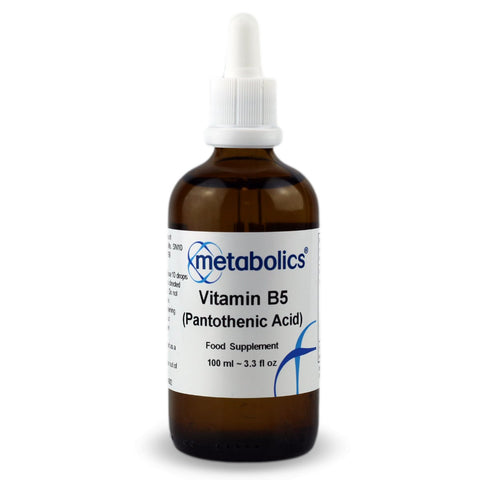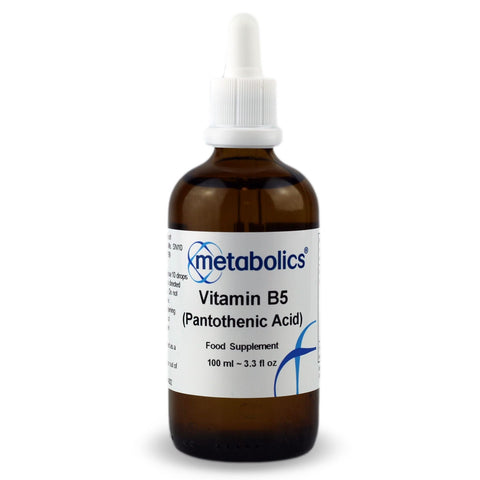Suitable For
This product has replaced the Metabolics Pantethine 100ml and Vitamin B5 (Pantethine) 90 Capsules, if you have any questions please get in touch.
Vitamin B5 is also known as pantothenic acid. It is one of the 8 water-soluble B vitamins and is converted to Pantethine in the body. Pantethine is not a vitamin.
Although Vitamin B5 is available in many foods (pantos is Greek for plentiful) namely animal products, green leafy vegetables and unprocessed grains, it is however broken down during the processing of foods. Bacteria in the colon also make pantothenic acid but it isn't known whether people absorb their own self manufactured B5 in significant amounts. Pantothenic Acid is needed in the manufacture of Coenzyme A (CoA) (See Acetyl-CoA Support Formula) and acyl carrier protein (ACP), two compounds that are critical in burning fats and carbohydrates in energy metabolism. Pantothenic acid not only helps the body convert carbohydrates to Glucose (for energy) but also helps the body use stored fats. For this reason it is commonly used for sports performance among athletes. It is also used by the body to make proteins, hormones, red blood cells and neurotransmitters including acetylcholine.
What does Vitamin B5 do?
- It contributes to normal energy yielding metabolism.
- It contributes to normal mental performance.
- It contributes to the reduction of tiredness and fatigue.
- It contributes to the synthesis and metabolism of steroid hormones.
- It contributes to the normal synthesis and metabolism of Vitamin D.
- It contributes to the normal synthesis and metabolism of some neurotransmitters.
Adrenal Support
Vitamin B5 is sometimes known as the anti-stress vitamin although there are no clinical trials to prove or disprove that it helps the body withstand stress however Pantethine deficiency in animal experiments has demonstrated a decrease in adrenocortical function. Vitamin B5 is converted to Pantethine, which is then converted to Acetyl Co A that, among other functions, is required for the production of adrenal hormones including Cortisol (steroid hormone) Rheumatoid Arthritis. One observational study found 66 people with RA had less blood pantothenic acid than 29 healthy people. The more severe the arthritis, the lower the levels of pantothenic acid (Barton-Write EC and Elliot WA, The pantothenic acid metabolism of rheumatoid arthritis: Lancet ii, 862,863, 1963) To follow up this study a small placebo controlled trial was conducted to see if pantothenic acid would help. Results showed that 2gm of pantothenic acid (as calcium pantothenate) reduced morning stiffness, pain and disability significantly better than a placebo. (General Practice Research Group, Calcium pantothenate in arthritic conditions. Practitioner 224,208-21, 1980). Pantethine isn't a vitamin but for reasons as yet unknown has significant lipid lowering activity, but pantothenic acid has very little (if any) effect in lowering cholesterol and triglyceride levels. Patients given 300 mg daily of pantethine had a significant reduction of serum triglyceride (32%) and total cholesterol (19%), and LDL (bad) cholesterol (21%) while increasing HDL (good) cholesterol (23%). Its mechanism of action appears to be to accelerate the utilization of fat as an energy source.
Deficiency of Vitamin B5
In humans the burning foot syndrome. The symptoms consist of numbness and shooting pains in the feet characterizes severe pantothenic acid deficiency. (Glusman 1947 noted prisoners in Asia in WW2 with burning foot syndrome) One of the first signs of pantothenic acid deficiency is fatigue. Healthy men, fed a low pantothenic acid diet developed fatigue ad listlessness after 2 months.(Fry PC, et al., Metabolic response to a pantothenic acid deficient diet in humans. J Nutr Sci Vitaminol 22, 339-346, 1976) Other deficiency symptoms may include irritability, restlessness, fatigue, apathy, nausea, vomiting, cramping as well as hypoglycaemia and increased insulin sensitivity. Animal studies have shown vitamin B5 may speed wound healing after surgery particularly if taken with vitamin C.
Recommended Daily allowance
- Infants birth - 6 months: 1.7 mg
- Infants 7 months - 1 year: 1.8 mg
- Children 1 - 3 years: 2 mg
- Children 4 - 8 years: 3 mg
- Children 9 - 13 years: 4 mg
- Teens 14 - 18 years: 5 mg
- 19 years and older: 5mg
- Pregnant women: 6mg
- Breastfeeding women: 7mg
Cautions:
Take Vitamin B5 at a different time of day from the antibiotic tetracycline as B5 interferes with its absorption. It may increase the effectivity of cholinesterase inhibitory drugs, which are used to treat Alzheimers. Seek medical advice if taking these drugs. Keep refrigerated to prolong its active state.
Supplement Facts
10 drops contains
%NRV*
Pantothenic acid (Vitamin B5)
6.8mg
113%
† Nutrient Reference Value (NRV*) not established
Ingredients
Directions / Dosage
 Liquid
Liquid
Warning
Storage
Product Type






